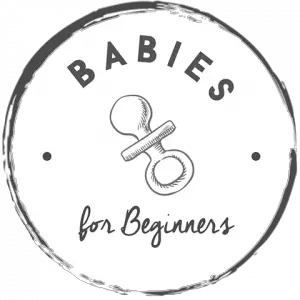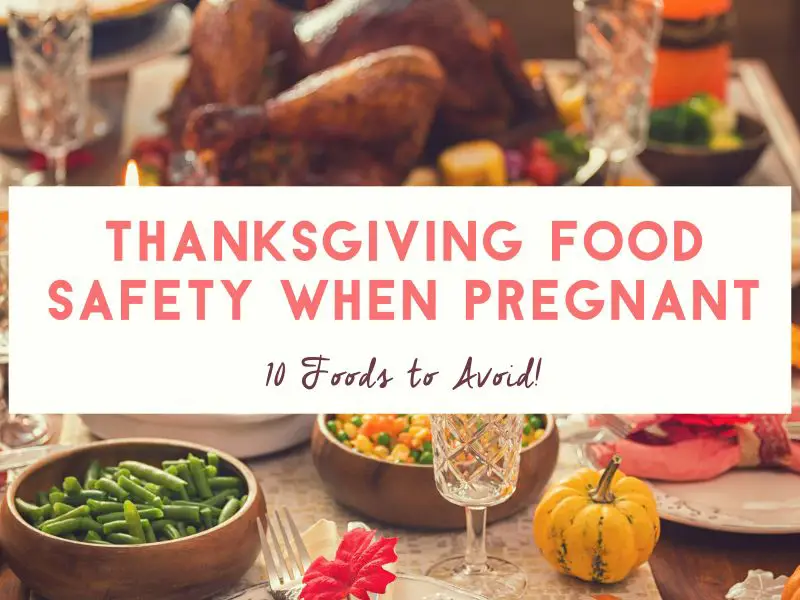Pregnancy weakens your immune system and makes you more vulnerable to food-borne illnesses that could make you sick and even harm your baby. So while your pregnancy may heighten this year’s Thanksgiving festivities, don’t forget to take extra precautions with the holiday foods you eat.
Why You Have to Be Careful What You Eat at Thanksgiving While Pregnant
Dangerous bacteria and parasites such as salmonella, listeria, toxoplasma, staphylococcus aureaus, and E. coli may be present in improperly prepared, cooked, and stored foods. Several of these, including listeria¹ and toxoplasma², can even cross your placenta and harm your baby even if you experience no symptoms yourself.
If these pathogens do cross the placental barrier It can lead to spontaneous abortions, stillbirths, preterm labor, and disseminated neonate infection despite antibiotics.¹
10 Thanksgiving Foods to Avoid While Pregnant
Here are some tips to keep you and your baby safe during the Thanksgiving holiday:
1. Undercooked Turkey
If your turkey is frozen, defrost it in the refrigerator, not on the counter or in a warm oven. Once defrosted, wash the turkey before you handle it to help remove any bacteria on the skin.
Don’t rely on cooking time and skin color to determine when your turkey is done; you need to cook the turkey to an internal temperature of 180°F.
To get an accurate internal temperature, insert a meat thermometer into the thickest part of the thigh muscle without touching the bone.
2. Undercooked Stuffing
If you usually cook the stuffing inside the turkey, cook it separately this year. If the stuffing is inside the turkey it will not reach a high enough temperature to kill bacteria (165 degrees F) without overcooking the turkey.
3. Smoked Meats, Meat Spreads, and Carving Stations
If you’re serving meat spreads such as pâté, or cold smoked meats such as smoked salmon, use only canned. Smoked fish and other meats and meat spreads that are found in the deli or refrigerated section of your grocery store may contain listeria.
If there is a carving station at a restaurant or party, make sure the meat is well-cooked.
As the CDC recommends, avoid eating hot dogs, lunch meats, cold cuts, other deli meats (such as bologna), or fermented or dry sausages unless they are heated to an internal temperature of 165°F or until steaming hot just before serving to avoid listeria.
4. Raw Sprouts
If you have that vegan Aunt who is really into raw right now, make sure to ask if she put sprouts in her potluck dish. Sprouts need warm, humid conditions to grow, which turns out to be the ideal for the growth of bacteria, including Listeria, Salmonella, and E. coli.
The CDC recommends pregnant women not eat raw or lightly cooked sprouts of any kind (including alfalfa, clover, radish, and mung bean sprouts).
5. Creamy Sauces
Avoid sauces such as hollandaise, béarnaise, and aioli, which may contain uncooked eggs.
Uncooked eggs are a concern, especially when pregnant, as It’s possible to get Salmonella from raw eggs; one in 20,000 has it.³
6. Raw Batter
When baking pies, cookies, or cakes, don’t taste the batter, as uncooked cookie dough contains raw eggs and raw flour, both of which can harbor bacteria.
Chewing gum while you’re baking can help you from mindlessly licking your fingers if they get batter on them (I do this ALL THE TIME)!
Sadly, even though many sources on the internet suggest simply using pasturized eggs and pre-heating your flour, Purdue University scientists found that home kitchen heat-treated flour doesn’t protect against foodborne illnesses.
7. Unpasteurized Soft Cheeses
The problem with soft cheeses are that many of them are made with unpasteruized milk. According to the Centers for Disease Control and Prevention (CDC), soft cheeses made with unpasteurized milk (also called raw milk) are estimated to be 50 to 160 times more likely to cause a Listeria infection than when they are made with pasteurized milk.
Some soft cheeses are made with pasteurized milk, and it will say so on the label. If you are not able to check the label, it’s best to steer clear of soft cheeses such as Brie, Camembert, goat cheese, Limburger, Montrachet, Neufchâtel, Pont L’Evêque, and Mexican-style cheese like queso fresco.
You should also avoid semi-soft cheeses such as Asiago, Bel Paese, bleu, brick, Gorgonzola, Havarti, Muenster, Port Salut, Taleggio, and blue-veined cheeses such as Roquefort. If you’re not sure whether a piece of cheese is safe or not, stick with cheddar, Swiss, and Monterey Jack.
8. Alcoholic Food Items
Most desserts that use alcohol as an ingredient, such as fruitcake, are okay to eat because most of the alcohol burns off during cooking.
However, if the dessert has been soaked in alcohol after baking, most of the alcohol will remain and you should avoid it.
9. Cider
Make sure any hot or cold apple cider you drink has been pasteurized. Unpasteurized juices can contain E. coli bacteria. Almost all juice sold is pasteurized, and unpasteurized juice sold in containers is required to carry a warning label.
10. Other Mystery Beverages
Always ask if you are unsure about the ingredients in drinks and watch out for hidden alcohol and caffeine. Make flavored seltzer or sparkling grape juice if you want a fun substitute.
Are Thanksgiving Leftovers Safe While Pregnant?
Be sure to refrigerate leftovers immediately, and use shallow pans and dishes so the food cools quickly. If kept in a refrigerator at 40 degrees F or less, leftovers can be safely eaten for the next two days; any longer may put you at risk for illness.
When you’re ready to eat them, leftovers should be reheated to at least 165°F before serving, according to the CDC.
Try freezing leftovers to make them last longer. And don’t rely on smell or appearance to indicate food safety; bacteria and germs that lead to illness can invade and spoil food long before it begins to smell bad.
Conclusion: Enjoy Thanksgivng food, Just Be Cautious and Take it Slow
With just a few tweaks and being choosy at the serving line, you can enjoy your Thankgiving feast while protecting you and your little one from food-borne illnesses.
But here’s a comfort tip: avoid gorging at the Thanksgiving table as you may have in years past. Depending on how far along you are in your pregnancy, you could end up with a nasty case of heartburn.
Try nibbling and snacking throughout the day instead of diving in with the rest of the family during the big meal. Also, bring your walking shoes and take a short walk between dinner and dessert; this will aid your digestion and burn off some of the day’s calories.
References
¹ Lamond, N. M., & Freitag, N. E. (2018). Vertical Transmission of Listeria monocytogenes: Probing the Balance between Protection from Pathogens and Fetal Tolerance. Pathogens (Basel, Switzerland), 7(2), 52. https://doi.org/10.3390/pathogens7020052
² Robbins, J. R., Zeldovich, V. B., Poukchanski, A., Boothroyd, J. C., & Bakardjiev, A. I. (2012). Tissue barriers of the human placenta to infection with Toxoplasma gondii. Infection and immunity, 80(1), 418–428. https://doi.org/10.1128/IAI.05899-11
³ Raw Eggs: Are There Health Benefits? WebMD. (2020). Retrieved October 17, 2022 from: https://www.webmd.com/diet/health-benefits-raw-eggs#1
Listeria prevention. Centers for Disease Control and Prevention (CDC). (2022). Retrieved October 17, 2022 from: https://www.cdc.gov/listeria/prevention.html
Preparing Your Holiday Turkey Safely. Centers for Disease Control and Prevention (CDC). (2021). Retrieved October 17, 2022 from: https://www.cdc.gov/foodsafety/communication/holiday-turkey.html
Wallheimer, B. (2021). Home kitchen heat-treated flour doesn’t protect against foodborne illnesses, Purdue food scientist says. Purdue University. Retrieved October 17, 2022 from: https://ag.purdue.edu/stories/home-kitchen-heat-treated-flour-doesnt-protect-against-foodborne-illnesses-purdue-food-scientist-says
FAQ
Can You Eat Thanksgiving Turkey when Pregnant?
Yes! You can enjoy Thanksgiving turkey when pregnant, as long as the internal temperature reaches safe 180 °F when cooking. The Turkey must reach this temperature to eliminate the bacteria that can cause illness for you and complicationf for your baby.
Can I Eat Thanksgiving Ham While Pregnant?
Absolutely you can eat Thanksgiving ham when pregnant, as long as the internal temperature reaches safe 165 °F degrees when cooking. The ham must reach this temperature to eliminate the bacteria that can cause problems for you and your baby.

